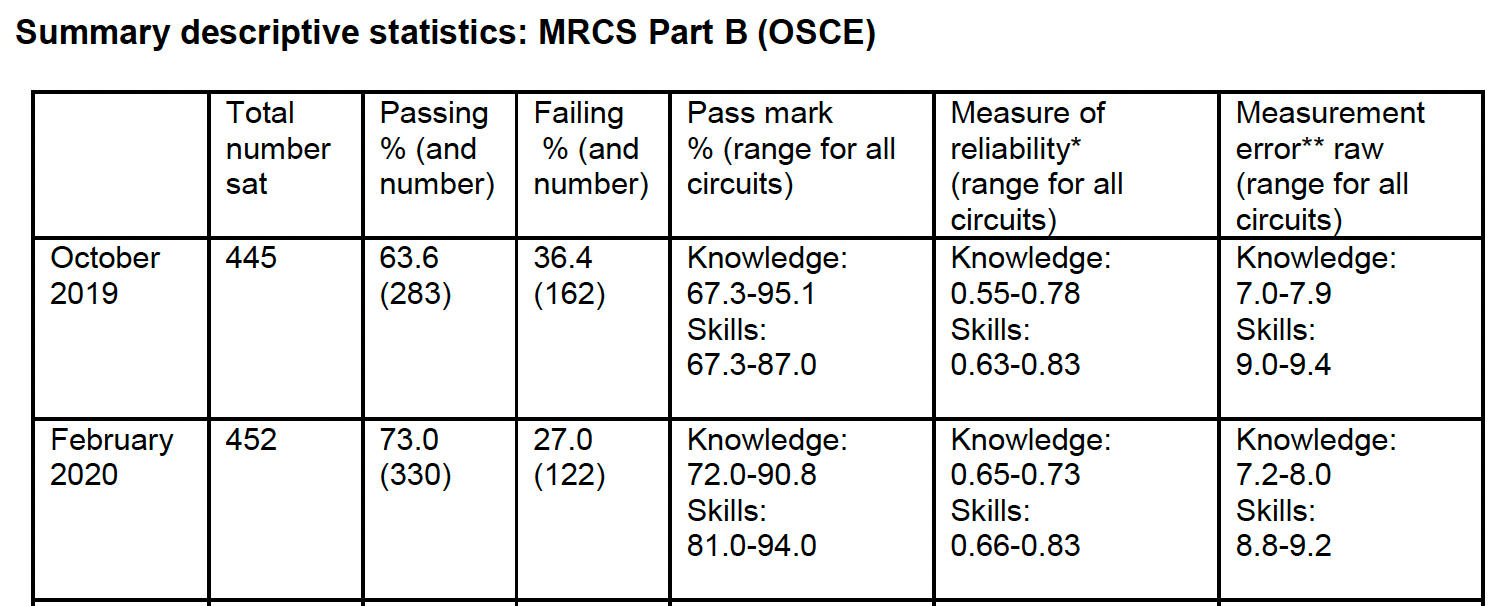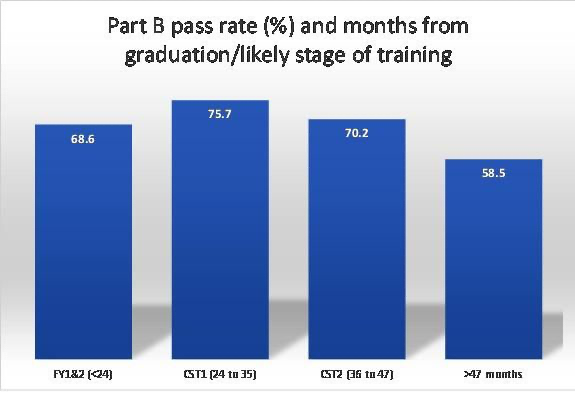What Is The MRCS Part B?
The MRCS Part B exam is the second and final examination required to gain Membership of the Royal Colleges of Surgeons (MRCS) at any of the four royal colleges in England, Glasgow, Edinburgh or Ireland. The MRCS tests the knowledge, experience and clinical competence expected of trainees at the end of their core surgical training. While the MRCS Part A is a written paper, Part B is an Objective Structured Clinical Exam (OSCE) similar to the practical OSCE exams used in medical school finals comprised of a series of stations in a circuit around which you rotate.
MRCS Part B Eligibility Criteria
Candidates must have passed Part A of the MRCS before they can take Part B.
In order to be eligible for the MRCS exam, you need to have a medical degree. It is essential that this is deemed acceptable by either the UK General Medical Council (GMC) or the Medical Council in Ireland, so you can be fully, provisionally or temporarily registered.
First time applicants not on the registers of the GMC or the Medical Council in Ireland, must submit their original medical degree certificate or an authenticated copy to the councils of colleges.
Candidates have 4 attempts in which to pass their Intercollegiate MRCS Part B OSCE and must successfully complete this within seven years of passing their Intercollegiate MRCS Part A.
MRCS Part B Application
Applications for Part B of the MRCS can be submitted through each of the Royal College of Surgeons websites. In total, there are four colleges where you can complete an application. These are the Royal College of Physicians and Surgeons of Glasgow; the Royal College of Surgeons of Edinburgh; the Royal College of Surgeons of England; or the Royal College of Surgeons of Ireland.
MRCS Part B Cost
The MRCS Part B is a very expensive exam. It costs around £1000 just to sit the exam and then there is the cost of online question banks and in-person mock OSCE courses which can set you back a further £500-1k.
MRCS Part B Exam Dates
There are usually three MRCS Part B exam sittings in the UK and Ireland each year:
- February
- May
- October
MRCS Part B Format
The MRCS Part B OSCE consists of 17 examined stations. Each station is 9 minutes long. There is an additional 1 minute for reading the task instructions before the station starts and 1 minute for moving between stations at the end
There may also be rest or preparation stations but these are not scored or examined. In total, the exam takes approximately 3.5 hours.
You'll rotate clockwise around each of the stations in the circuit and will be guided by an examiner. As it's a long exam they usually break the circuits into two with a 15 minute rest between circuits where you are under exam conditions.
At each station you'll be required to undertake a clearly defined task. In the MRCS Part B OSCE these may include taking a focused history or clinical examination, interpreting an X-ray or performing a simulated practical procedure. At the start of each station there are instructions for the candidate, which briefly outline the scenario and describe the task that you need to undertake. Stations are manned by one or two examiners who score the candidate using a set marking scheme that we'll look at shortly.
The various stations examine the applied knowledge and applied skills of each candidate and are divided up into 4 content areas:
Applied Knowledge (8 stations):
- Anatomy and surgical pathology (5 stations)
- Applied surgical science and critical care (3 stations)
Applied Skills (9 stations)
- Clinical and procedural skills (5 stations)
- Communication skills (4 stations) - history taking and giving and receiving information
MRCS Part B Scoring
Each MRCS Part B station is marked out of a total of 20 marks on a structured mark scheme and in addition candidates will be awarded a separate, overall global rating for the station as a fail, borderline or pass based on the judgment of the examiers at that station.
The 8 Applied Knowledge stations (anatomy, surgical pathology and surgical sciences and critical care) give a score out of 160 marks and the 9 Applied Skills stations give a score out of 180 marks.
What is MRCS Part B The Pass Mark?
To pass the MRCS Part B you need to pass both the Apllied Knowledge and Applied Skills content area and the passing mark for each is set after the exam based on the difficulty of your specific exam that you sat. This is because Part B stations can vary between test centers and the pass mark is personalised to your day and exam circuit rather than being a fixed generic percentage for fairness.
If we look at some of the data from the exam board for Part B we can see that around 70% of candidates pass at each sitting and you need to pass roughly 70% or more of the stations in Applied Knowledge and Applied Skills meaning if you fail 1 or 2 stations in each you can still pass Part B.

When Should You Sit The MRCS Part B?
The Royal College of Surgeons suggests sitting the MRCS Part B in Core Surgical Year 2 but lots of people sit it earlier as CST2 is when you want to be focusing on surgical specialty job interviews.
If we look at a research study published in the BMJ in 2017 which surveyed successful candidates between 2008 and 2016 it shows that pass rate was highest for those sitting in core surgical year 1.

How to Pass the MRCS Part B
The MRCS Part B, like any OSCE or in-person medical exam, doesn't just test your knowledge but also tests your practical skills and your communication skills which can be more difficult to improve compared to revising for a written exam like Part A where you can jump in and do loads of questions in a question bank.
The level of difficulty for the MRCS Part B can be greatly reduced by ensuring that you are fully prepared for the exam. This means having a solid understanding of the syllabus as well as being familiar with the format of the exam. It’s also important to make use of resources such as textbooks and practice questions to consolidate your knowledge. Furthermore, revision courses can be extremely beneficial as they provide you with an opportunity to test your knowledge and identify any areas that require further revision.
Typically it is recommended to use a mix of the MRCS syllabus, textbooks, videos, question banks and mock exams.
The MRCS Part B Syllabus
The MRCS syllabus is a useful resource for candidates who are preparing to take both parts of the exam. Within the syllabus, there are several sections that provide candidates with helpful information. These include a background and overview of the MRCS exams, as well as the recommended textbooks that candidates can base their revision and preparation on. The syllabus also indicates the topics and skills that might be examined in the MRCS exams. The final section of the syllabus is dedicated to MRCS Part B sample questions. Going through a range of practice questions allows you to determine a response to each of the scenarios that you are likely to come across.
MRCS Part B Questions
Practising realistic MRCS Part B scenarios is key for effective preparation. You will need to revise a mix of anatomy, applied sciences as well as practical and communication skills.
Knowing where to start can be tough which is why we created MRCS Part B questions which provides you with realistic MRCS Part B scenarios covering all stations and with questions taking from past MRCS Part B examinations.
MRCS Part B Books
The Royal College of Surgeons website provides an extensive list of books that can help you to prepare for the MRCS exams:
- Grant’s Atlas of Anatomy (13th ed.)
- Ganong’s review of medical physiology (25th ed.)
- Last’s Anatomy: Regional and Applied (12th ed.)
- Essential revision notes for Intercollegiate MRCS : book 1 (2006)
- Access to surgery : 500 single best answers in general & systemic physiology (2007)
- Surgical critical care for the MRCS OSCE (2015)
- Physical examination for surgeons : an aid to the MRCS OSCE (2015)
- SBA MCQs for the MRCS Part A (2013)
- MRCS Part A : 500 SBAs and EMQs (2013)
- Intercollegiate MRCS part A : SBAs and EMQs : mock papers with comprehensive answers (2013)
- Principles and Practice of Surgery (7th ed.)
- Robbins Basic Pathology (10th ed.)
- Gray’s Basic Anatomy, (2nd ed.)
- Gray’s Atlas of Anatomy (2nd ed.)
- Gray’s Anatomy (2016)
- Netter’s Atlas of Human Anatomy (7th ed.)
- Last’s Anatomy, (12th ed.)
- Guyton and Hall Textbook of Medical Physiology, (13th ed.)
- Netter’s Clinical Anatomy (4th ed.)
Is the MRCS Part B Exam Difficult?
The highest pass rate for MRCS Part B is 75%, which was recorded during the autumn 2020 exams. More candidates tend to pass Part B of the exam than Part A. However, you only get four attempts to complete Part B, whereas with Part A you get six opportunities.
The difficulty in which you find MRCS Part B will largely depend on how well you prepare. While knowledge is an integral component of MRCS Part B, making use of the right exam technique is crucial. Therefore, it’s important that you learn how to extract and present your knowledge in response to each exam question.
How To Improve Your Communication Skills For The MRCS Part B
One of the main skills that you will be assessed on during MRCS Part B is your ability to communicate. You will be assessed on your ability to explain surgical procedures as well as give concise and well organized answers. Effective communication is an essential skill for surgeons as it allows you to effectively convey complex information to patients, families and other members of the healthcare team.